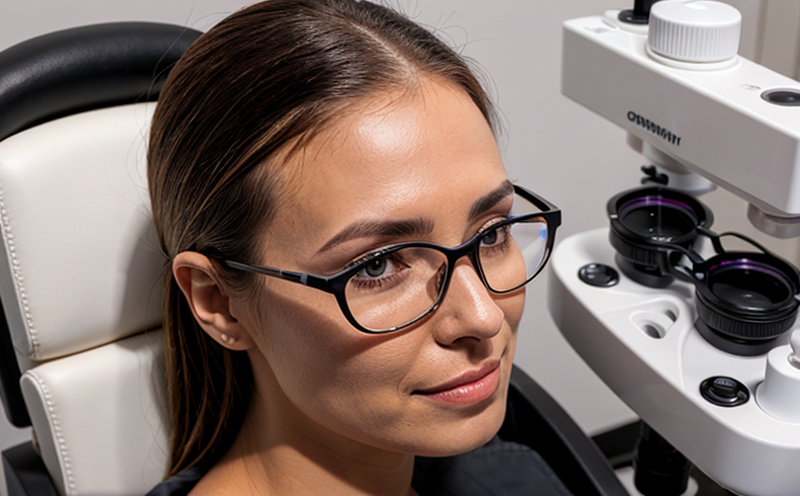USP Related Substances HPLC Testing of Ophthalmics
The United States Pharmacopeia (USP) is a compendium that sets standards for medicines and related healthcare products. USP-related substance testing ensures the quality, safety, and efficacy of pharmaceuticals, including ophthalmic products. This service focuses on High-Performance Liquid Chromatography (HPLC) analysis to detect trace amounts of impurities or degradation products in ophthalmic solutions.
Ophthalmic products are typically delivered as eye drops or suspensions used for treating a wide range of ocular conditions such as glaucoma, conjunctivitis, and dry eyes. Given the direct contact with the delicate ocular surface, it is critical that these products meet strict purity standards to prevent adverse reactions.
HPLC testing plays a pivotal role in ensuring compliance with USP Chapter 23, which addresses the identification of related substances. This chapter specifies limits for impurities that may be present in drug products and their excipients. By employing HPLC, we can quantify trace amounts of these impurities accurately.
Our testing process begins with receiving a sample from our clients or directly procured from the manufacturer. The samples are then prepared according to USP guidelines for the specific product being tested. We use state-of-the-art equipment and follow rigorous protocols to ensure precision and reliability in results. After analysis, we provide detailed reports that outline the presence of any detected impurities along with their concentrations.
The benefits of this testing extend beyond mere regulatory compliance; it also enhances patient safety by ensuring that only high-quality products reach the market. This service is particularly valuable for companies involved in pharmaceutical research and development (R&D) as well as those responsible for quality assurance and procurement within the healthcare industry.
- Compliance with USP Chapter 23
- Identification of impurities that could impact product safety and efficacy
- Absence of contaminants that might cause adverse reactions
Real-World Applications
In the pharmaceutical industry, HPLC testing is essential for maintaining product integrity. For instance, during clinical trials, accurate identification and quantification of related substances help in assessing drug stability over time. Post-market surveillance relies heavily on these tests to monitor any potential issues that may arise after launch.
Additionally, this service supports continuous improvement efforts within manufacturing facilities by identifying sources of impurities early in the production process. This proactive approach helps companies stay ahead of regulatory requirements and enhance their reputation among consumers.
Why It Matters
The significance of USP-related substance testing cannot be overstated, especially when dealing with ophthalmic products due to their intimate contact with the eye. Even trace amounts of impurities can lead to severe complications such as irritation, inflammation, or even more serious conditions like corneal ulceration.
Regulatory bodies worldwide recognize the importance of these tests and mandate adherence to specific limits set forth by USP standards. Failure to meet these requirements can result in product recalls, legal action, and damage to brand reputation. Therefore, investing in robust testing procedures is not only a compliance issue but also a strategic business decision.
For research and development teams, this service provides valuable insights into the performance of new formulations. Understanding where impurities originate allows for targeted improvements in formulation design, which ultimately leads to better patient outcomes.
Environmental and Sustainability Contributions
- Eco-Friendly Reagents: We use only environmentally friendly solvents and reagents during our HPLC analyses. These materials are chosen for their low toxicity and minimal environmental impact.
- Efficient Resource Usage: By ensuring that only high-quality products pass through the testing phase, we reduce waste associated with substandard materials.
The rigorous nature of our testing ensures that defective products are identified early in the supply chain, minimizing resource consumption throughout the manufacturing process. This approach aligns closely with broader sustainability goals aimed at reducing overall environmental footprint across industries.
Use Cases and Application Examples
- Clinical Trial Monitoring: During clinical trials, HPLC testing helps monitor the stability of investigational drugs over extended periods. This data is crucial for determining safe dosages and potential side effects.
- New Product Development: For companies developing new ophthalmic products, this service provides critical information about impurity profiles early in the development cycle. This insight supports informed decision-making regarding formulation adjustments.
- Post-Market Surveillance: After product approval and release into the market, ongoing HPLC testing ensures that no unexpected changes occur over time. Such tests are vital for maintaining trust with consumers and regulatory authorities alike.





